

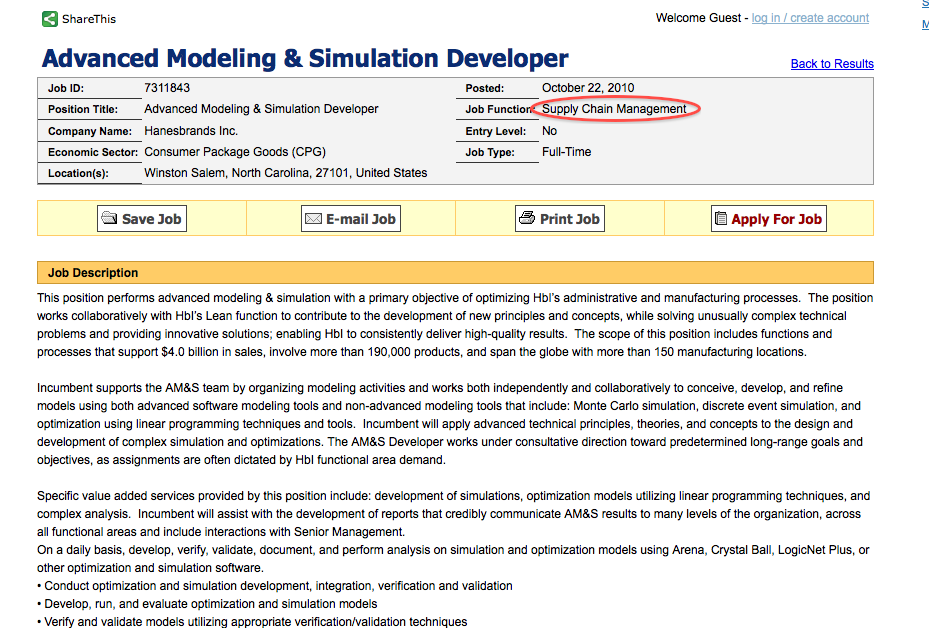


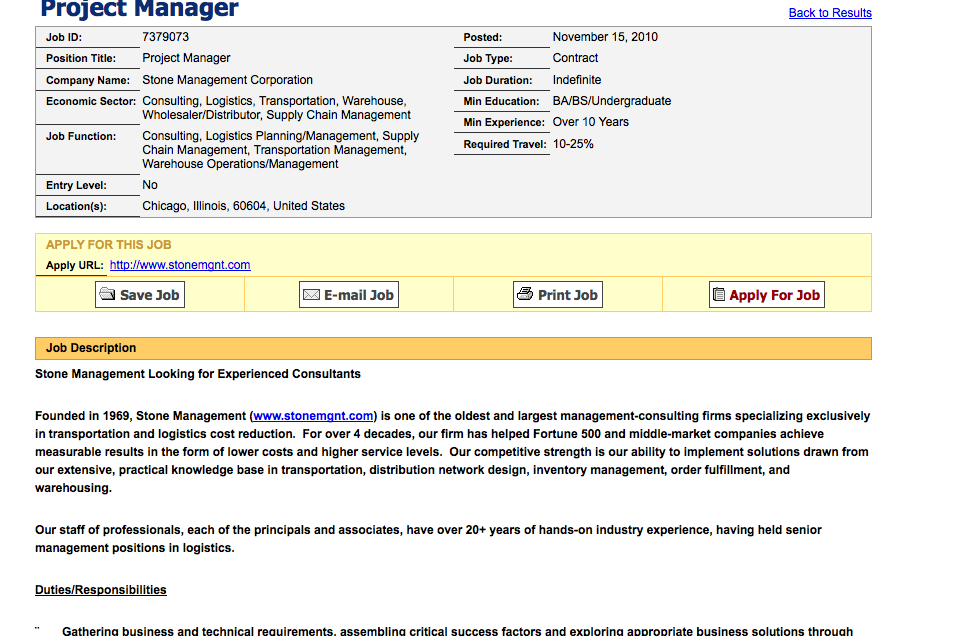


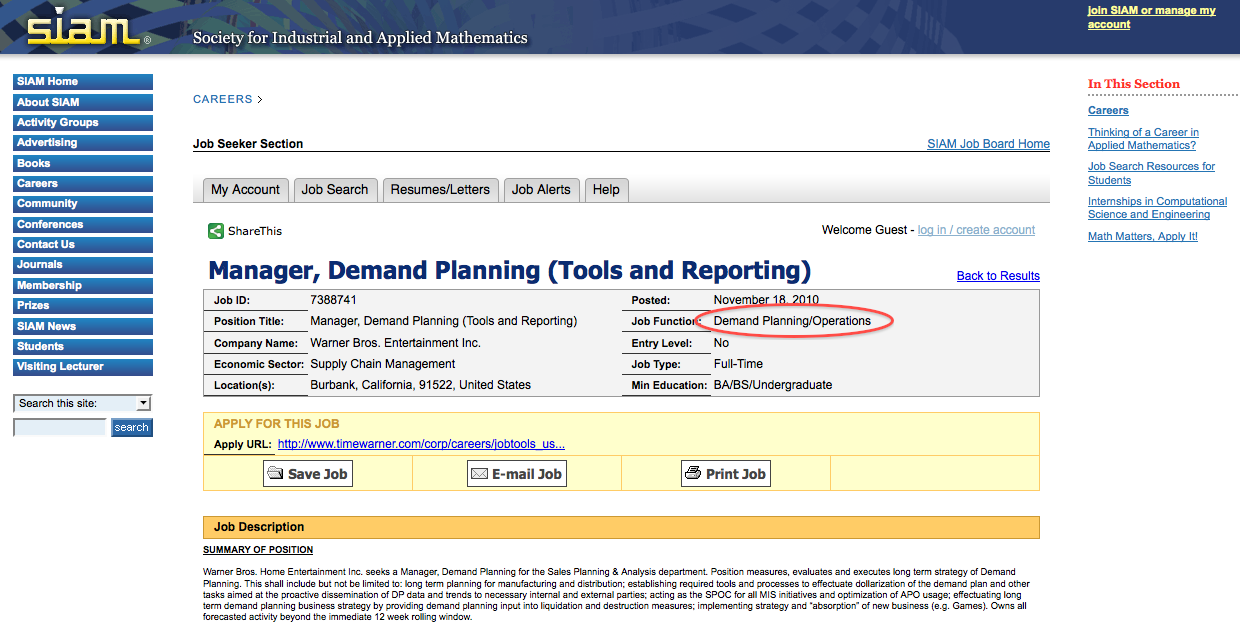



Overview:
Where do (non-academic) mathematicians work?
Area of Manager’s degree
Application areas for Industrial Mathematics
Mathematics Success Stories
Industrial Mathematics research is interdisciplinary
Formulating problems and finding solutions
Communication and teamwork
How mathematicians are viewed within Industry
Why hire mathematicians?
What are the shortcomings of mathematicians?
How can mathematicians improve in industry? 

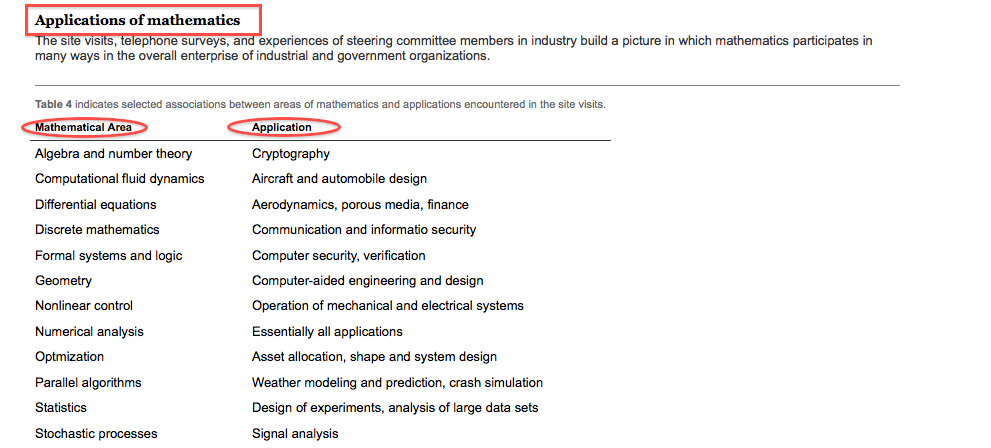
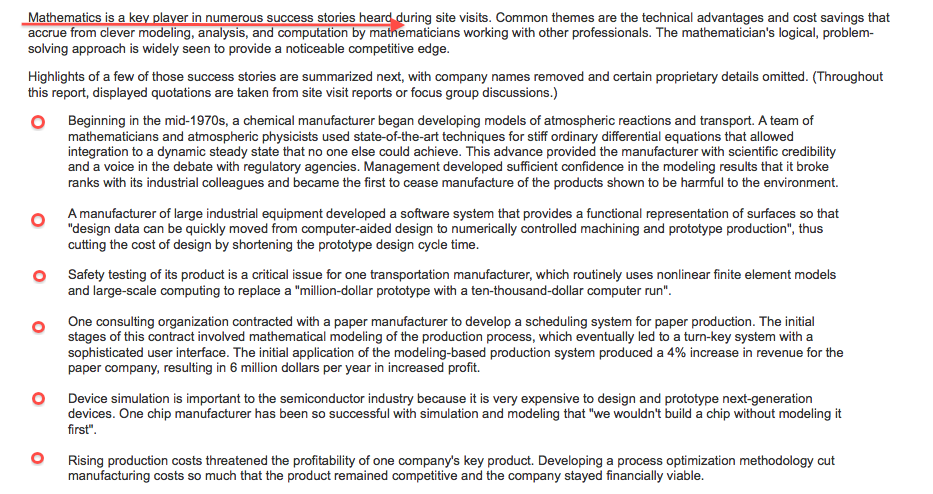
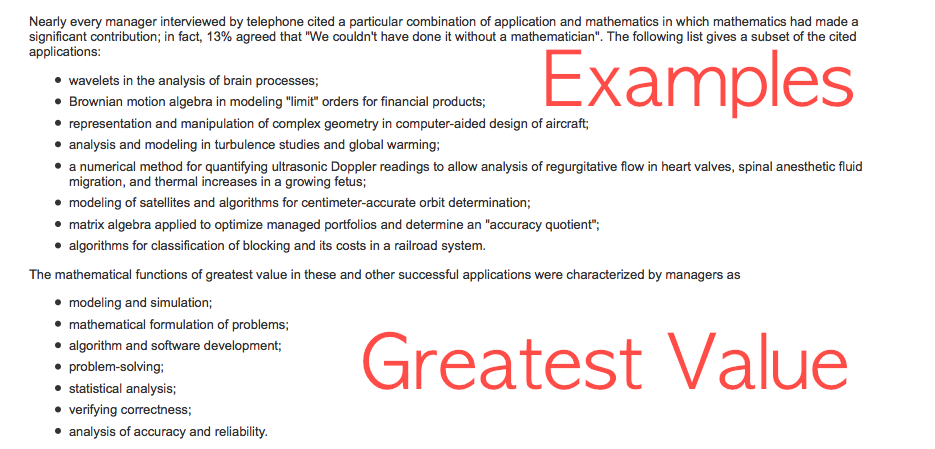


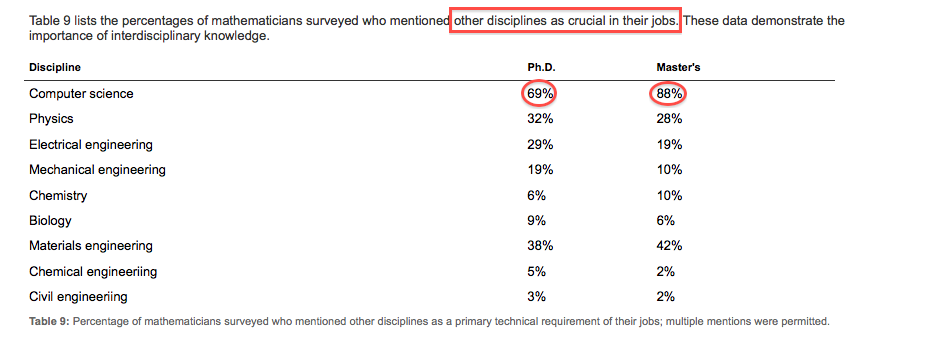
In the life of a nonacademic mathematician, two themes not traditionally associated with core academic mathematics emerged clearly from our surveys, site visits, and discussions:
The first of these themes was emphasized repeatedly during our site visits. Industrial problems are almost never stated in mathematical form when first presented to a nonacademic mathematician; and even if they are posed initially in mathematical terms, alternative formulations may eventually turn out to be preferable. Consequently, successful nonacademic work demands the ability to understand problems couched in terminology from another field, and to discern and analyze the important underlying mathematical structures and questions.
The hardest task for a mathematician is developing the real problem requirements. The user doesn’t usually know what the solution will look like in the end.
Sometimes customers recognize the problems. In other cases, all they can do is express their frustration and you must figure out the problem.
Problems never come in formulated as mathematics problems. A mathematician’s biggest contribution to a team is often an ability to state the right question.
For a nonacademic mathematician, “solving” a problem usually does not mean a tidy theorem or counterexample, or even one-shot numerical results. Industrial problems typically evolve over time, as inadequacies in the original model are revealed or data and assumptions become more precise. Once a mathematician successfully obtains a theoretical or numerical solution to an initial, possibly simplified problem, he or she is frequently asked to analyze and solve an extended, sometimes fundamentally different, problem. In other cases, mathematicians can show that a particular mathematical formulation is flawed, but this does not dispose of the original, larger problem that remains to be solved. Arriving at the best formulation of a problem—realistic, yet mathematically reasonable—is an inherently interactive and complicated process.
It is essentially never the case that someone comes in and says “Here is an equation; please solve it”, and then that’s the end of the story. The mathematics presented in the first discussion is usually the tip of the iceberg.
In addition to dealing with shifting problem formulations, industrial mathematicians are expected to provide “answers” even when no rigorous solution can be found. Timely, useful results, albeit incomplete, are often of critical importance, especially during the process of problem formulation. In some instances, it is more productive to expose quickly a potentially defective formulation than to work out a lengthy complete solution.
You may be ahead if you find only 80% of the solution if this takes 20% of the work required to find the complete solution.
Most problems must be “solved” in hours or days; this often means finding an adequate solution rather than a perfect one.
Industrial mathematicians are almost always asked to find the best solution under time and budget constraints.
Section 3.1–Section 3.4 have stressed that mathematicians in industry are not solving problems solely for themselves and other mathematicians: they must actively collaborate with colleagues and managers who are not mathematicians, and they must be able to justify the value of their work to their organization.
It is almost never possible for a nonacademic mathematician to work in isolation and communicate only with specialists in a narrow area. Successful industrial mathematicians accordingly require a high degree of communication skills in several forms—speaking, writing, and listening—and at several levels. Technical and business interactions often continue over a long period of time, so that clear exchanges of information and ideas are crucial.
You can’t just toss the results over the fence.
It is essential that you follow up on the problem; check whether the customer has implemented your solution, whether it worked out, whether further tuning is necessary.
The most effective people are those who can interact, understand, translate. A key is being able to explain something outside your discipline.
The importance of communication skills is emphasized equally strongly in other, more general studies such as [IRI91, NRC-Grad, Natr89].
During our site visits, we heard frequently that industrial mathematicians must possess a closely related quality: the ability to work effectively in close collaboration with diverse groups.
Lack of interpersonal and team skills is the primary cause of failure in industry. An example of failure was a mathematician who would talk only to other mathematicians, and whose attitude was “Just tell me what the problem is and I will solve it.”
Recent studies have highlighted a similar need for teamwork among Ph.D.’s of all varieties employed outside academia; see, for example, [IRI91, NRC-Grad]. A closely related issue is the need for an attitude of flexibility and a willingness to use different techniques and work in new areas.
As a final element in our examination of the working environment for industrial mathematicians, we asked site visit participants and managers in the telephone survey about two issues: Why are mathematicians valued? What are their perceived strong and weak points? There was a high degree of consistency in the answers to these questions, particularly to the first.
Numerous site visit participants articulated, sometimes in almost identical words, two main reasons that industrial mathematicians are valued:
As indicated in Section 2 and Section 3.4, problems in industrial mathematics can arise from anywhere, most often in poorly defined and evolving forms. Mathematicians are valued because they can see and understand the inner nature of a problem; determine which features matter and which do not; and develop a mathematical representation that conveys the essence of the problem and can be solved numerically.
Powerful—even pure—mathematicians are better equipped to keep going when textbooks have to be left behind.
Mathematicians do not always know the answers, but they know the right questions to ask and they know when the questions being asked are wrong.
Mathematicians are better equipped than others in coming up with the correct definitions of problems and developing the right level of abstraction.
Mathematicians have an ability to deal with abstraction, uncoupled from specific technology and involving many subsystems; to develop models for the abstract systems; to use a common language (mathematics) to communicate the results; and to apply well-developed skills to spot hidden gaps and identify connections.
The key idea is not that mathematicians are ignorant of details, but that their training equips them to deal with problems at an abstract, system-wide level, independently of commitments to a particular approach or technology.
An example of these abilities was described during a site visit: mathematicians were modeling a production plant running below design capacity and began asking for data about aspects of the plant operation. Their systematic questions highlighted the root of the problem before a model was even assembled. Details that we heard of the stories sketched in Section 2.2 illustrate the crucial “edge” provided by mathematical insights and techniques.
A distinction between Ph.D.’s and master’s graduates frequently mentioned during site visits was that master’s graduates are willing to “look under the hood”; that they are more flexible, especially with an undergraduate degree in a second discipline; and that they are willing to approach any problem. On the other hand, a Ph.D. is seen as bringing a deeper understanding of how to solve difficult problems.
Managers interviewed by telephone were asked about the reasons for hiring mathematicians. The most frequent specific answers given for hiring Ph.D.’s and master’s graduates are grouped and summarized next, with percentage of respondents shown in parentheses.
Why hire mathematics Ph.D.’s?
What makes mathematics Ph.D.’s special?
Why hire mathematics master’s graduates?
What makes mathematics master’s graduates special?
We also asked managers about what they believed to be shortcomings or limitations of mathematicians. The responses confirmed certain common images—in some instances, full-blown negative stereotypes—of mathematicians. According to site visit participants, these views are based mainly on their encounters with mathematicians who did not understand a nonacademic environment.
A weakness of a mathematician is tunnel vision: write a paper and that’s the solution.
Some managers feel that mathematicians in general have a bad image; they don’t care about the real environment—realistic models, cost, implementation. They are concerned instead with proving irrelevant theorems.
It is important for mathematicians to learn that they can’t continue their investigations forever. They have to learn to say “enough” in the available time.
Mathematicians are sometimes viewed as being unwilling to become involved with an organization’s real business issues, perhaps because, one stereotype suggests, those problems are not sufficiently elegant or interesting mathematically to warrant attention.
Managers in the telephone survey were asked to name areas in which mathematicians could improve; the most frequent responses are shown with the percentage of respondents in parentheses.
In what areas could industrial mathematicians be improved?
In the context of describing opportunities for mathematicians, several site visit participants commented that mathematicians sometimes do not make the best possible case for either their discipline or themselves. For example, one manager observed that mathematicians who seek or already occupy nonacademic positions do not often play to what she sees as their strongest point: their background provides the ability to “see into application areas” and thus be major contributors in strongly interdisciplinary work. A manager at a different site urged mathematicians to “take advantage of the interdisciplinary nature of mathematics. Exploit it or lose”. And a third manager was genuinely perplexed at the “apparent unwillingness of mathematicians to assume their rightful role in the science landscape.”
Overview:
How can mathematicians improve in industry?
Some Web Search Highlights
Math in Industry Article
Linear Algebra and Google
SIAM: Careers in Mathematics Brochure
USA BLS on Mathematicians
O*Net on Mathematicians
Sloan Career Cornerstone: Math
Profiles of Mathematicians in Industry 
(Thanks to Richard Cerezo richard.cerezo@utoronto.ca for some of these links.)
Scroll down to part D) on industrial-academic forums. Here are some audio links,